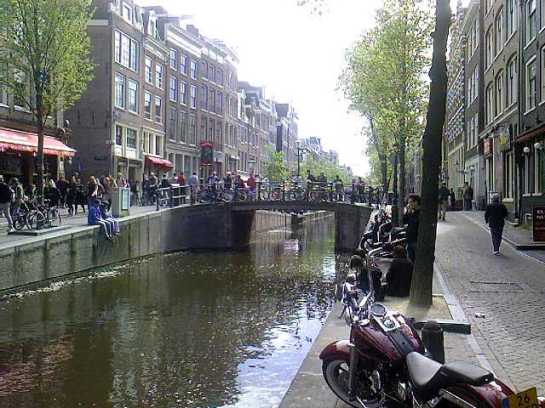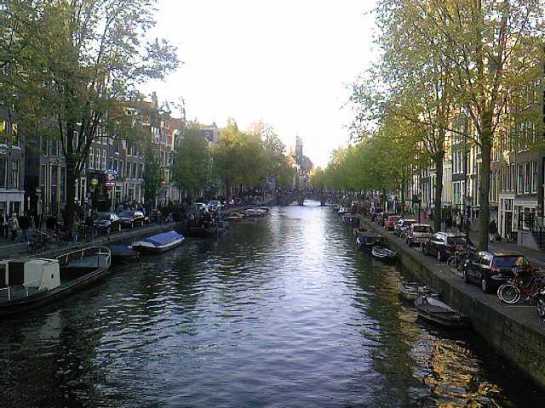The End of the History Manifesto
Jo Guldi (Brown) and David Armitage (Harvard) wrote The History Manifesto (html or PDF). On May 12 professor Armitage came to Amsterdam to defend it at the Academy of Sciences KNAW.
The authors argue that historical research gets lost into short-term-ism and overspecialisation, and that there is a growing need for the longue durée (Fernand Braudel 1902-1985) and “big stories”. The Manifesto closes with a call-to-arms:
“Once called upon to offer their advice on political development and land-reform, the creation of the welfare state and post-conflict settlement, historians, along with other humanists, effectively ceded the public arena, nationally as well as globally, to the economists and occasionally lawyers and political scientists. (When was the last time a historian was seconded to Downing Street or the White House from their academic post, let alone consulted for the World Bank or advised the UN Secretary-General?) It may be little wonder, then, that we have a crisis of global governance, that we are all at the mercy of unregulated financial markets, and that anthropogenic climate change threatens our political stability and the survival of species. To put these challenges in perspective, and to combat the short-termism of our time, we urgently need the wide-angle, long-range views only historians can provide. Historians of the world, unite! There is a world to win–before it’s too late.” (The History Manifesto p125 – my emphasis)
Remarkably, on the three indicated areas economics has much more to offer than history:
- For climate change and survival of the species there is my book on the Tinbergen & Hueting Approach (2009, 2015).
- On unregulated financial markets and income inequality, there are my books DRGTPE (2000, 2005, 2011) from before the crisis and CSBH (2012) from after the crisis – see above About page.
- On global governance there is the analysis in DRGTPE that each nation better adopts a constitutional Economic Supreme Court (ESC) – so that the national ESCs can exchange information and thus contribute to global co-ordination and stability. For example, see this memo in the RES Newsletter of Fall 2014.
These issues can only be resolved by economics. One needs to study political economy (see DRGTPE for its definition) and have a solid background in econometrics and macro-economic modeling to understand and judge the issues. It is necessary indeed to take the long view, since it are this kind of topics. By implication the economist looking into these issues might be regarded as being a “historian” – and perhaps historians are willing to respect this even though such an economist might have no formal training in such an MA course.
It puts the horse behind the cart when one presumes that a student of the past would, by this kind of academic study, hit upon the proper advice to deal with these issues for the future. I am afraid that Guldi & Armitage are seriously mistaken here. It is important for a political economist to delve into history, and historians can provide valuable service here, but a historian would have to become a political economist if he or she is to say something about these subjects.
Consistent links
Of course, when the survival of the species is at stake, and thus also the survival of historians, then one can imagine that some historians feel the need to say something about this. But rather than starting to re-invent the wheel themselves, they are advised to check out the designated smiths. Dutch readers may check my question on ecological survival for the Dutch research agenda to 2025.
Admittedly, I may not be the typical economist, and Guldi & Armitage merely “misunderestimated” the situation. Originally I wanted to study archeology but it was because of Biafra and the world problems that I decided to turn to econometrics. At the KNAW session I indeed met an archeologist who confirmed that he was quite comfortable with long time scales. My recent revisit of the old interest is in “The simple mathematics of Jesus” (2012). An apt reference is also to this weblog text.
I am also struck by this statement in the manifesto:
“There is no public office of the long term that you can call for answers about who, if anyone, is preparing to respond to these epochal changes.” (The History Manifesto, p 1)
Traditionally people have the right to petition the monarch, and democracy seems to reduce the need for that, but our model of democracy still fails. The creation of an Economic Supreme Court would amend that. Some analysts who see short-term-ism everywhere might fear that the ESC would also fall victim to it. However, it is the task of the ESC to check the quality of the information for policy making. Hence, it looks at both the short and the long terms.
A question during the session
The discussion monitor at KNAW invited an economist in the audience to ask a question. My question was:
“The Dutch prime minister Mark Rutte studied history. However, he shows quite a disrespect for science. How is it possible that an academic study causes this kind of disrespect, and what can be done to ensure that the study of the past maintains scientific standards ?” (Rephrased.)
Dutch readers can check that I essentially asked the same question for the Dutch National Research Agenda for 2025. A key problem is: when a historian in a public debate makes an error against science then he or she is seldomly corrected by another historian.
Mark Rutte is a counterexample to the Guldi & Armitage bracketed question above: here we have a historian with access to the corridors of power. Check on Rutte e.g. here. Another example appears to be William Hague. One can also understand that my question is essentially critical of the History Manifesto too: Are Guldi & Armitage not similarly disrespectful of science, by claiming more for history than history can do ?
The Dutch word for science is “wetenschap” and it does not distinguish between the humanities and the “hard” sciences. My question fell a bit in the trap of the distinction made in the Anglo-Saxon world. Professor Armitage referred to C.P. Snow and the “two cultures” lecture of 1959, and indicated that the gap ought to be bridged. He explained how students of history at Harvard are encouraged to look into the sciences, including mathematics and computer science. He did not go into the issue that the scientific method should be used in history as a science too. Fortunately the History Manifesto on occasion refers to the humanities as a science too (say p 10), but then it should also apply the methodology of science – with the comparative advantage of Verstehen.
Thus his answer left me unsatisfied. For these same considerations as Snow had, the Econometric Society was founded in 1930, with an offshoot in cliometrics. The gap between the “two cultures” can only be bridged when it becomes mandatory that a sizeable section of the humanities have also a background in the sciences – i.e. when the humanities stop claiming that they would be so very special and when they concentrate their contribution on what they indeed are special in and what indeed is their comparative advantage. Indeed, this will also require a re-engineering of the education of mathematics, see “Elegance with Substance” (2009).
The panelists
Invited panelists were Mathijs Bouman (economic journalist), Rens Bod (director of Digital Humanities), Hanco Jürgens (Germany Institute Amsterdam) and Siep Stuurman (emeritus UU).
Rens Bod was most ambitious: historians should also predict the future. This indeed fits the scientific method, and prevents that historians just tell fancy stories and enhance those with the authority of age. The ambition to look at the future fits the ancient tradition in history, check e.g. Thucydides and the wish to study history to learn from it. The ambition however runs the risk of failure when historians are not up to the task. Thucydides of course wrote at a time when he could not rely on a well-developed discipline of political economy.
Hanco Jürgens wondered whether there really was a crisis in the humanities and a lack of public attention for history. He referred to the commemorations of WW II this month. That Russia had taken the Crimea put an end to Francis Fukuyama’s End of History and meant a Return of History. There is rather a change in the public role of the intellectual. In Holland in 2030 likely half of the student population will have higher education (?) and that will mean a change in the kind of public debate.
Siep Stuurman emphasized professionalism. Historians should remain critical. The “protestant wind” that destroyed the Armada is an obvious bias – see “Whig history“. The method of the longue durée rather looks for turns that enlighten issues (and that were surprising to participants too). Thomas Malthus had fine data from the past but lacked insight in what technology had in store. History can puncture myths, like that protectionism hindered development and that free trade supported it: in the past protectionism was the norm, and England only imposed free trade when it had the advantage anyway. His main point was that history provides serial contexts.
The other economist: Mathijs Bouman
Bouman supported the criticism of short-term-ism by giving the example of the 2008 financial crisis. He labeled financial analysts as “historians” since they used time series data. They used only a few decades, and thus they missed systematic national risk on house prices. He agreed that a good economist is also a historian. On the other side he found the History Manifesto biased against neo-liberalism. Marx and Piketty got too much attention, even though the latter indeed presented data over a much longer period. The long term would require an unbiased view too.
Bouman supported my critical question above by stating that developing a view about the future does not only require data from the past but also model assumptions: and what theory was Armitage using ?
Of course, Bouman did not explain to professor Armitage that the directorate of the Dutch Central Planning Bureau has been censoring my work since 1990. In general, visitors who come to Holland are treated as guests and they meet with kind people and have pleasant discussions. These visitors will tend to think that Holland is an open and tolerant country. KNAW functions as a Potemkin village for foreign scientists.
Conclusion
Given that economics already solved the three major problems mentioned by Guldi & Armitage – so that it is only a matter that the Parliaments of the world start studying on those solutions – I can only advise that the historians enter these notions in their history books. By consequence there is little use for the History Manifesto.
What we should appreciate is its opening statement of “speaking truth to power“. This can best be done by embracing the scientific method, to first find that truth, and then say it.
Addendum May 14
A statement in the manifesto about what Paul Warde would have shown made me very curious and caused me to check this on the internet: I found a discussion by Pseudo Erasmus on errors in the manifesto also on other statements. Perhaps this is a case in which historians correct other historians.
I also found the criticism by Cohen & Mandler in the AHR rather convincing. The best thing would be to retract the manifesto as an apparently insufficiently researched opinion piece that needs better contemplation.


